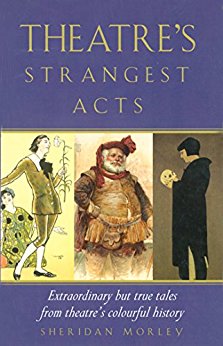| Illuminating and Informing Pot-pourri |
Theatre History |
| Sheridan Morley “Theatre's Strangest Acts” , Robson Books , August 20, 2011 |
 The algorithms in the book-malls of the cyberworld throw up their suggestions and recommendations. They rarely surprise for the very fact of their algorithmic foundation. Life is a different matter as it is complex, combining predictability and randomness. The best of travel too is serendipitous. So is it with eight days in the valley of the Tyne. I have made a visit to Live Theatre on Newcastle's river shore which was of immense interest. But my mornings are my own, my travelling companions at this stage not wanting to know much of the day prior to mid-day.
The algorithms in the book-malls of the cyberworld throw up their suggestions and recommendations. They rarely surprise for the very fact of their algorithmic foundation. Life is a different matter as it is complex, combining predictability and randomness. The best of travel too is serendipitous. So is it with eight days in the valley of the Tyne. I have made a visit to Live Theatre on Newcastle's river shore which was of immense interest. But my mornings are my own, my travelling companions at this stage not wanting to know much of the day prior to mid-day. Thus do the market stalls next to Hexham's Abbey yield up serendipitous books and DVDs. In normal circumstances Sheridan Morley, the biographer of Noel Coward, with a book title of this kind, would have not attracted attention. But then holidays are a time for altering usual patterns. In fact the book's title is a misnomer. It has its name to fit the publisher's previous twenty-six titles, the genres as various as boxing and gambling, science and politics. In actuality Sheridan Morley has picked out seventy moments of theatre history and written them up in a couple of pages of easy prose apiece. The locations are overwhelmingly London with an occasional foray to Europe and the USA. The names are many and come from a recognisable canon. Beerbohm Tree, Bates, Burton, Dench, du Maurier, Eyre, Hare, Helpmann, Horrocks, Mac Liammóir, Mendes, Orton, O'Toole, various Redgraves, Sher, Wanamaker: they are all remembered. If the compendium is not theatre criticism it is significantly higher than gossip. Morley starts with an evocation of where it all began or at least where the human record exists. In Athens twenty thousand, the entire male population, pack a stadium built for fourteen thousand. Sophocles is an acclaimed and award-winning author. But he is less successful as an actor with audience complaint that his voice is thin and reedy. Vaulting the centuries Christopher Marlowe's offences against the mores of the zeitgeist are multiple. That he survives until the age of twenty-nine may have been helped in part by the fact that his lovers included the brother of Walsingham, Elizabeth's spy-master. Another monarch in a later era meets a family member at the theatre. At Drury Lane George III lets fly at his son and knocks the Prince of Wales to the ground. This is all visibly done in public. Honours for those in the arts is now a commonplace but it was not always thus. The first actor to be knighted was Henry Irving in 1895. “The whole of London society was scandalised” writes Morley. He adds telling details to the tale of Wilde's downfall. The playwright brazenly wears a green carnation, a well-recognised indicator. The Marquess of Queensberry had already lost his elder son, Lord Drumlanrig, in an ostensible shooting accident. Rumour swirled that a scandal involving the Prime Minister had been about to erupt. The occasional tale leaves the stage door far behind. Morley captures Ivor Novello in all his colossal fame and celebrity. Novello has an interest in meeting the equally successful writer Edgar Wallace. It fails to happen. On a train out of New York Novello has his pet dog with him. He joins him in the guard's luggage wagon and sits on a box covered with a black blanket. When the guard finds him he is somewhat discomforted, the container being in fact a coffin. Novello asks and the guard replies “It's going to London, sir. And on the same liner as you. He was a theatrical gentleman too. His name was Edgar Wallace.” Morley discovers different childhoods of theatre greats. J M Barrie had an elder brother who died aged thirteen leaving his mother broken. “James Barrie tried to act, talk, and even dress like his deceased brother, to convince her that her elder son was still alive.” Cecil Day-Lewis, the Poet Laureate, was ill for seven years before his death in 1972. Daniel, in Morley's description, was “an introverted and sad boy...become a withdrawn and private man.” The actor “has written...of his own frequent melancholy and sense of decay.” By contrast Morley describes a boy on a visit to the Vaudeville Theatre in 1954. It is the day of his eighth birthday, the treat a gift of an aunt. The show is “Salad Days” and “the little boy was entranced.” His dress for the West End is kilt with all the trimmings, lace shirt and sporran. He has a name that is as Scottish as is the outfit. The boy who meets the musical is called Cameron Mackintosh. Undeniably a pot-pourri these not so strange tales nonetheless make an illuminating theatre book. |
Reviewed by: Adam Somerset |
This review has been read 1655 times There are 31 other reviews of productions with this title in our database:
|
